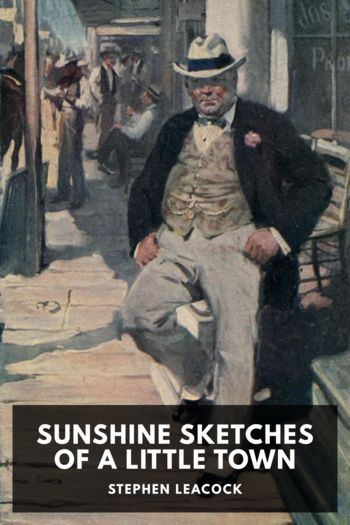Sunshine Sketches of a Little Town, Stephen Leacock [people reading books .TXT] 📗

- Author: Stephen Leacock
Book online «Sunshine Sketches of a Little Town, Stephen Leacock [people reading books .TXT] 📗». Author Stephen Leacock
But of course you hardly recognize them while the train is still passing through the suburbs and the golf district and the outlying parts of the city area. But wait a little, and you will see that when the city is well behind you, bit by bit the train changes its character. The electric locomotive that took you through the city tunnels is off now and the old wood engine is hitched on in its place. I suppose, very probably, you haven’t seen one of these wood engines since you were a boy forty years ago—the old engine with a wide top like a hat on its funnel, and with sparks enough to light up a suit for damages once in every mile.
Do you see, too, that the trim little cars that came out of the city on the electric suburban express are being discarded now at the way stations, one by one, and in their place is the old familiar car with the stuff cushions in red plush (how gorgeous it once seemed!) and with a box stove set up in one end of it? The stove is burning furiously at its sticks this autumn evening, for the air sets in chill as you get clear away from the city and are rising up to the higher ground of the country of the pines and the lakes.
Look from the window as you go. The city is far behind now and right and left of you there are trim farms with elms and maples near them and with tall windmills beside the barns that you can still see in the gathering dusk. There is a dull red light from the windows of the farmstead. It must be comfortable there after the roar and clatter of the city, and only think of the still quiet of it.
As you sit back half dreaming in the car, you keep wondering why it is that you never came up before in all these years. Ever so many times you planned that just as soon as the rush and strain of business eased up a little, you would take the train and go back to the little town to see what it was like now, and if things had changed much since your day. But each time when your holidays came, somehow you changed your mind and went down to Naragansett or Nagahuckett or Nagasomething, and left over the visit to Mariposa for another time.
It is almost night now. You can still see the trees and the fences and the farmsteads, but they are fading fast in the twilight. They have lengthened out the train by this time with a string of flat cars and freight cars between where we are sitting and the engine. But at every crossway we can hear the long muffled roar of the whistle, dying to a melancholy wail that echoes into the woods; the woods, I say, for the farms are thinning out and the track plunges here and there into great stretches of bush—tall tamerack and red scrub willow and with a tangled undergrowth of bush that has defied for two generations all attempts to clear it into the form of fields.
Why, look, that great space that seems to open out in the half dark of the falling evening—why, surely yes—Lake Ossawippi, the big lake, as they used to call it, from which the river runs down to the smaller lake—Lake Wissanotti—where the town of Mariposa has lain waiting for you there for thirty years.
This is Lake Ossawippi surely enough. You would know it anywhere by the broad, still, black water with hardly a ripple, and with the grip of the coming frost already on it. Such a great sheet of blackness it looks as the train thunders along the side, swinging the curve of the embankment at a breakneck speed as it rounds the corner of the lake.
How fast the train goes this autumn night! You have travelled, I know you have, in the Empire State Express, and the New Limited and the Maritime Express that holds the record of six hundred whirling miles from Paris to Marseilles. But what are they to this, this mad career, this breakneck speed, this thundering roar of the Mariposa local driving hard to its home! Don’t tell me that the speed is only twenty-five miles an hour. I don’t care what it is. I tell you, and you can prove it for yourself if you will, that that train of mingled flat cars and coaches that goes tearing into the night, its engine whistle shrieking out its warning into the silent woods and echoing over the dull still lake, is the fastest train in the whole world.
Yes, and the best too—the most comfortable, the most reliable, the most luxurious and the speediest train that ever turned a wheel.
And the most genial, the most sociable too. See how the passengers all turn and talk to one another now as they get nearer and nearer to the little town. That dull reserve that seemed to hold the passengers in the electric suburban has clean vanished and gone. They are talking—listen—of the harvest, and the late election, and of how the local member is mentioned for the cabinet and all the old familiar topics of the sort. Already the conductor has changed his glazed hat for an ordinary round Christie and you can hear the passengers calling him and the brakesman “Bill” and “Sam” as if they were all one family.
What is it now—nine thirty? Ah, then we must be nearing the town—this big bush that we are





Comments (0)